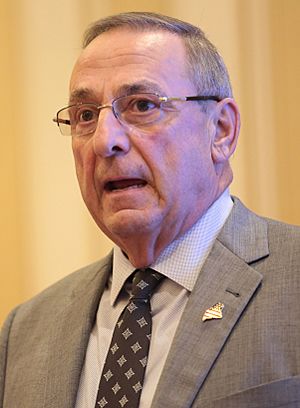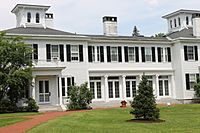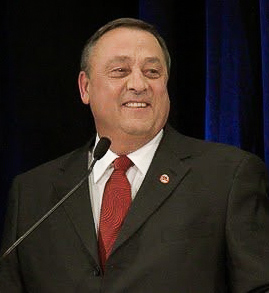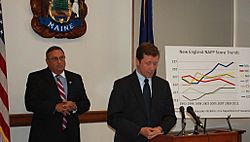Paul LePage facts for kids
Quick facts for kids
Paul LePage
|
|
|---|---|

LePage in 2017
|
|
| 74th Governor of Maine | |
| In office January 5, 2011 – January 2, 2019 |
|
| Preceded by | John Baldacci |
| Succeeded by | Janet Mills |
| 50th Mayor of Waterville | |
| In office January 6, 2004 – January 5, 2011 |
|
| Preceded by | Nelson Madore |
| Succeeded by | Dana Sennett |
| Personal details | |
| Born |
Paul Richard LePage
October 9, 1948 Lewiston, Maine, U.S. |
| Political party | Republican |
| Spouses |
|
| Children | 4 |
| Education | Husson University (BS) University of Maine (MBA) |
Paul Richard LePage (born October 9, 1948) is an American businessman and politician. He served as the 74th governor of Maine from 2011 to 2019. As a member of the Republican Party, he was also the mayor of Waterville, Maine, from 2004 to 2011.
LePage won the 2010 election for governor and was re-elected in 2014. As governor, he was known for using his veto power often. A veto is when a governor rejects a bill passed by the state legislature. He vetoed 652 bills by July 2018. This was more than all of Maine's governors from the past 100 years combined. LePage was also known for his strong opinions, which sometimes led to national attention.
Because of term limit laws in Maine, LePage could not run for a third term in a row. He was followed by Democrat Janet Mills. After leaving office, he moved to Florida. He returned to Maine to run for governor again in 2022 but lost to Mills. On May 5, 2025, he announced he would run for a seat in the U.S. House of Representatives in 2026.
Contents
Early Life and Education
LePage was born in Lewiston, Maine, on October 9, 1948. He was the oldest of eighteen children. His parents were of French Canadian heritage, and he grew up speaking French. His family was very poor, and he had a difficult childhood.
At age eleven, he ran away from home. He lived on the streets of Lewiston for about two years. To make money, he shined shoes, washed dishes, and did other small jobs. He was the only one of his siblings to graduate from the 8th grade. He later graduated from Lewiston High School in 1967.
LePage wanted to go to Husson College but was not accepted at first. This was because his English skills were not strong enough for the entrance exam. However, a state representative named Peter Snowe helped him. Snowe convinced the college to let LePage take a test in French. LePage passed and was admitted to Husson.
At college, he worked hard to improve his English and became the editor of the school newspaper. He earned a degree in business. Later, he earned a Master of Business Administration (MBA) from the University of Maine.
Business and Early Political Career
After getting his MBA, LePage worked for a lumber company in New Brunswick, Canada. He later worked for other companies in Maine. In the 1980s, he started his own consulting company to help businesses that were struggling. In 1996, he became the general manager of Marden's, a popular discount store chain in Maine.
LePage first entered politics in 1997. He was elected to the Waterville city council and served until 2002.
Mayor of Waterville
In 2003, LePage ran for mayor of Waterville and won. As mayor, he worked to lower city taxes. He also helped increase the city's savings from $1 million to $10 million. He was re-elected in 2008. He served as mayor until he became governor in 2011.
Governor of Maine

2010 Election
In 2009, LePage announced he would run for governor of Maine. He won the Republican primary election. In the main election, he faced a Democratic candidate and three independent candidates.
LePage won the election with about 38% of the vote. He promised to make government smaller, lower taxes, and reduce rules for businesses.
2014 Election
LePage ran for re-election in 2014. He faced Democratic Congressman Mike Michaud and independent candidate Eliot Cutler. LePage won again, this time with about 48% of the vote.
Time as Governor
As governor, LePage was known for his strong positions. He used his veto power more than any other governor in Maine's history. Most of his vetoes happened after 2013, when Democrats gained control of the Legislature.
LePage supported Donald Trump for president in 2016. He was also the first Maine governor to use social media like Twitter to talk about his yearly State of the State speech.
While governor, Maine changed its voting system to ranked-choice voting. This system was supported by voters in a 2016 vote. LePage did not support this change.
Political Views
LePage has clear views on many topics. He often shared his opinions on how to improve Maine's government and economy.
Economy and Jobs
LePage believed that Maine's rules for starting a business were too difficult. He wanted to make it cheaper and easier for companies to open. He supported lowering taxes, including the state income tax.
He also had ideas about child labor laws. He thought that letting teenagers work more could teach them a good work ethic. He suggested allowing businesses to pay a "training wage" to young workers.
Education
LePage supported a school voucher system. This would give parents public money to send their children to private schools. He also believed teacher pay should be based on performance.
In 2011, he signed a bill to adopt the Common Core standards in Maine schools. However, he later changed his mind and opposed them. He was worried about the federal government having too much control over local education.
Environment and Energy
LePage did not agree with the scientific view that climate change is a major threat. He supported using more fossil fuels and wanted to reduce environmental rules to help businesses. He was the only governor on the Atlantic coast who promoted offshore oil drilling.
He was a critic of wind power, arguing that it made electricity too expensive in Maine. He supported renewable energy sources that he felt were more reliable, like hydropower.
Government Reform
LePage thought the state government was too large. He wanted to reduce the number of state employees. He also called for an end to term limits for state lawmakers. He believed experienced lawmakers could serve the state better.
He was critical of Maine's citizen initiative process, where voters can create laws directly. He felt that this process needed reform.
Personal Life
LePage married his first wife, Sharon Crabbe, in 1971. They had two daughters and divorced in 1980. In 1984, he married his second wife, Ann DeRosby, and they have two children. Their family also includes a young man from Jamaica whom LePage calls his adopted son.
After his time as governor, LePage and his wife moved to Florida. They returned to Maine in 2019, and he even worked as a bartender for a summer. After losing the 2022 election, he returned to Florida.
In 2017, LePage had weight-loss surgery after his doctor warned him about his health. He said he lost 50 pounds.
Electoral History
| Maine's gubernatorial Republican primary election, 2010 | |||
|---|---|---|---|
| Party | Candidate | Votes | % |
| Republican | Paul LePage | 49,126 | 37.38 |
| Republican | Leslie Otten | 22,945 | 17.46 |
| Republican | Peter Mills | 19,271 | 14.67 |
| Republican | Steven Abbott | 17,209 | 13.10 |
| Republican | William Beardsley | 12,061 | 9.17 |
| Republican | Bruce Poliquin | 6,471 | 4.92 |
| Republican | Matthew Jacobson | 4,324 | 3.29 |
| Maine's gubernatorial election, 2010 | |||
|---|---|---|---|
| Party | Candidate | Votes | % |
| Republican | Paul LePage | 218,065 | 37.6 |
| Independent | Eliot Cutler | 208,270 | 35.9 |
| Democratic | Elizabeth "Libby" Mitchell | 109,387 | 18.8 |
| Independent | Shawn Moody | 28,756 | 5.0 |
| Independent | Kevin Scott | 5,664 | 1.0 |
| Others | Others | 2,624 | 0.5 |
| Maine's gubernatorial election, 2014 | |||
|---|---|---|---|
| Party | Candidate | Votes | % |
| Republican | Paul LePage (inc.) | 294,519 | 48.18 |
| Democratic | Mike Michaud | 265,114 | 43.37 |
| Independent | Eliot Cutler | 51,515 | 8.43 |
| Others | Others | 79 | 0.01 |
| Party | Candidate | Votes | % | |
|---|---|---|---|---|
| Republican | Paul LePage | 65,684 | 100 | |
| Party | Candidate | Votes | % | |
|---|---|---|---|---|
| Democratic | Janet Mills (incumbent) | 373,372 | 55.7 | |
| Republican | Paul LePage | 286,440 | 42.5 | |
Images for kids
See also
 In Spanish: Paul LePage para niños
In Spanish: Paul LePage para niños
 | Percy Lavon Julian |
 | Katherine Johnson |
 | George Washington Carver |
 | Annie Easley |




